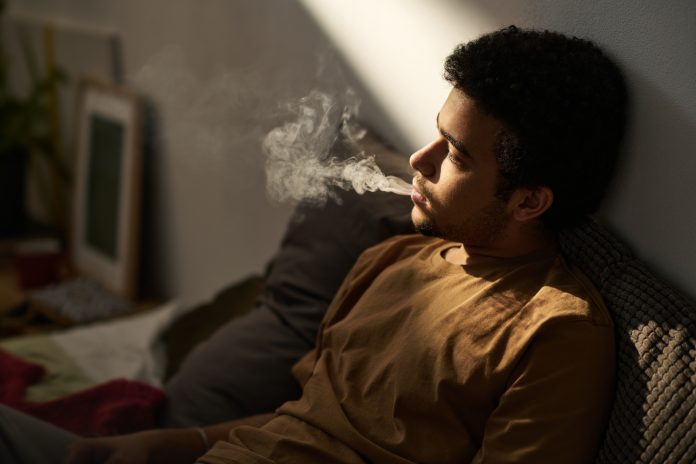2025’s largest-ever cannabis use study reveals self-medication and childhood trauma intensify paranoia and mental health risks
A new 2025 study, led by researchers at King’s College London and the University of Bath, is the largest of its kind to examine how self-medication with cannabis affects mental health in the general population. The team’s findings, which reveal that cannabis use to self-medicate is linked to a higher risk of paranoia, anxiety, and other poor mental health outcomes, are of significant importance. This underscores the need for public awareness and informed guidance on cannabis use, providing a new level of understanding for healthcare professionals, policymakers, researchers, and the informed public.
The findings are detailed in BMJ Mental Health.
The motivation behind cannabis use strongly influences long-term health
Cannabis use is increasing worldwide, and cannabis-induced psychosis is rising in tandem, especially in North America. The research team examined two research papers, both using data from Cannabis & Me, and identified key risk factors associated with more severe forms of paranoia in cannabis users.
Over 3,300 former and current cannabis users aged 18 and over responded to a survey examining their reasons for first and continued use, their weekly consumption of cannabis in THC units, and their mental health.
Researchers discovered a key finding: Respondents who first started using cannabis to self-medicate an illness, including physical pain, anxiety, depression, or because they were experiencing minor psychotic symptoms, all demonstrated higher paranoia scores, which are a measure of the level of paranoia experienced by an individual. Contrastingly, respondents who tried cannabis for fun or curiosity, or with their friends, reported the lowest average paranoia and anxiety.
Dr Edoardo Spinazzola, a Research Assistant at King’s IoPPN and the study’s first author, said, “Our study provides vital evidence on how the reason someone first starts using cannabis can dramatically impact their long-term health.
“This research suggests that using cannabis as a means to self-medicate physical or mental discomfort can have a negative impact on the levels of paranoia, anxiety, and depression. Most of these subgroups had average scores of depression and anxiety, which were above the threshold for referral to counselling.”
The impact of THC on paranoia
The respondents were asked to provide data on the frequency and strength of the cannabis they were using so that researchers could track their average weekly consumption of Tetrahydrocannabinol (THC), the principal psychoactive component of cannabis.
The researchers found that the average respondent consumed 206 units of THC a week. Cannabis users who used the drug to help with their anxiety, depression, or in cases where they started due to others in their houses already using cannabis, reported on average 248, 254.7, and 286.9 average weekly THC units, respectively.
Professor Tom Freeman, Director of the Addiction and Mental Health Group at the University of Bath and one of the study’s authors, said, “A key finding of our research is that people who first used cannabis to manage anxiety or depression, or because a family member was using it, showed higher levels of cannabis use overall.
“In the future, standard THC units could be used similarly to alcohol units – for example, to help people to track their cannabis consumption and better manage its effects on their health.”
The link between childhood trauma and cannabis use
Another study, published in Psychological Medicine, explored the relationship between childhood trauma, paranoia, and cannabis use. The researchers used the same data set from the Cannabis & Me survey and found that 52% of respondents reported a form of trauma.
The analysis revealed that respondents who experienced childhood trauma reported higher average levels of paranoia compared to those who hadn’t, with physical and emotional abuse emerging as the strongest predictors.
The researchers also investigated the link between childhood trauma and weekly THC consumption. They found that respondents who experienced sexual abuse had a higher weekly intake of THC, closely followed by respondents reporting emotional and physical abuse.
The researchers confirmed that the strong association between childhood trauma and paranoia is further exacerbated by cannabis use, but is affected by the different types of trauma experienced. Respondents who said they had experienced emotional abuse or household discord were strongly associated with increased THC consumption and paranoia scores. Respondents reporting bullying, physical abuse, sexual abuse, physical neglect, and emotional neglect, on the other hand, did not show the same effects.
Dr Giulia Trotta, a Consultant Psychiatrist and Researcher at King’s IoPPN and the study’s first author, said, “This comprehensive study is the first to explore the interplay between childhood trauma, paranoia, and cannabis use among cannabis users from the general population.
“We have not only established a clear association between trauma and future paranoia, but also that cannabis use can further exacerbate the effects of this, depending on what form the trauma takes.
“Our findings will have clear implications for clinical practice as they highlight the importance of early screening for trauma exposure in individuals presenting with paranoia.”
Professor Marta Di Forti, Professor of Drug use, Genetics and Psychosis at King’s IoPPN, Clinical Lead at the South London and Maudsley NHS Foundation Trust’s Cannabis Clinic for Patients with Psychosis, and the senior author on both studies, said, “There is extensive national and international debate about the legality and safety of cannabis use.
“My experience in the clinic tells me that there are groups of people who start to use cannabis as a means of coping with physical and emotional pain. My research has confirmed that this is not without significant further risk to their health and wellbeing, and policy makers across the world should be mindful of the impact that legalisation, without adequate public education and health support, could have on both the individual, as well as on healthcare systems more broadly.”











